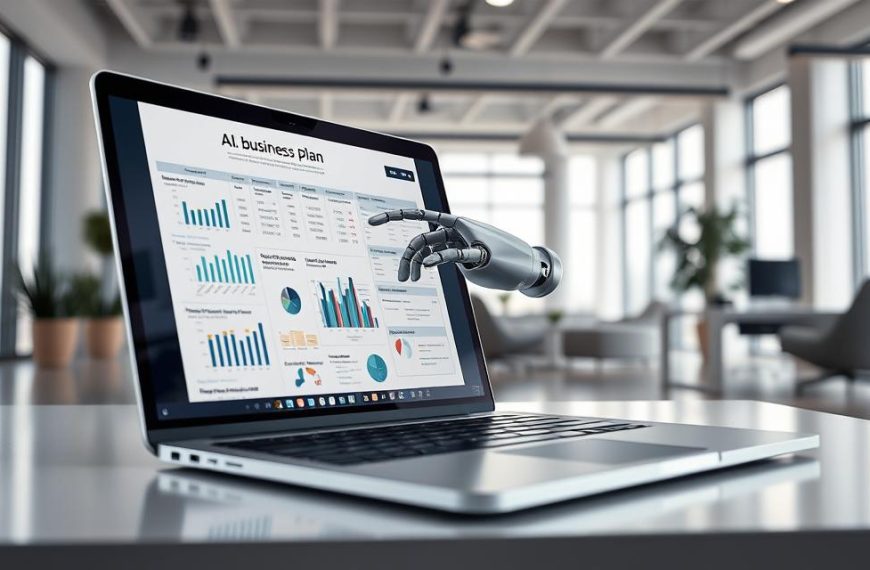Modern companies are rapidly adopting artificial intelligence to enhance their operations. According to Gartner, 79% of strategists believe AI and analytics are critical for success. This shift is driven by the need for greater efficiency and innovation in a competitive market.
PwC reports that 73% of U.S. companies have already integrated AI into their workflows. Harvard Business School Professor Karim Lakhani emphasizes that the future of business is AI-powered. This highlights the universal impact of these technologies across industries.
Despite the growing adoption, a Microsoft survey reveals that 67% of small and medium-sized businesses lack a clear understanding of AI. Strategic implementation is essential to unlock its full potential. This article explores five key ways AI transforms operations, offering actionable insights for organizations.
Introduction to AI in Business
The integration of advanced technologies is reshaping industries globally. Artificial intelligence plays a pivotal role in this digital transformation, enabling organizations to optimize their processes and stay competitive. From healthcare to finance, AI-driven solutions are redefining how businesses operate.
In healthcare, systems like IBM Watson assist in critical decision-making, such as cancer treatment plans. These technologies enhance accuracy and efficiency, saving lives and resources. Similarly, in finance, AI detects fraudulent activities, ensuring secure transactions and trust.
Companies like Shell use predictive analytics to optimize oil drilling operations. By analyzing sensor data, they reduce downtime and improve productivity. This approach highlights the transformative power of AI in traditional industries.
“This transformation is bigger than the internet,” says Jen Stave of Harvard’s D^3 Institute.
Adopting AI is no longer optional but a necessity for operational reinvention. Organizations that embrace these technologies gain a competitive edge, driving innovation and growth.
1. Increases in Efficiency and Productivity
Efficiency and productivity are critical drivers of success in today’s competitive landscape. Organizations are adopting innovative solutions to streamline processes and maximize output. From automating repetitive tasks to leveraging data-driven insights, these advancements are reshaping workflows across industries.
Automating Repetitive Tasks
Repetitive tasks like invoice processing and data entry consume valuable time. Automation tools handle these activities, freeing up employees for more strategic roles. For example, AI-powered systems process invoices in minutes, reducing errors and improving efficiency.
Streamlining Workflows
In manufacturing and logistics, workflow automation minimizes delays and optimizes resource allocation. Companies like Shell use predictive maintenance systems to monitor equipment, saving $1 billion annually. This approach ensures smoother operations and higher productivity.
Data-Driven Insights
Access to real-time data enables organizations to make informed decisions. Machine learning algorithms analyze patterns, providing actionable insights. Sephora, for instance, uses AI to manage inventory, ensuring products are always in stock.
“The integration of these technologies is transforming how we work,” says a McKinsey report.
By redistributing resources and focusing on strategic initiatives, companies achieve significant time savings. A Constant Contact survey found that businesses save 40 minutes weekly through automation. These advancements not only enhance efficiency but also drive innovation. For more insights, explore how generative AI boosts productivity in highly skilled roles.
2. Enhanced Decision-Making
Decision-making in business is evolving with advanced technologies. Organizations now rely on data-driven systems to make informed choices. These tools provide actionable insights, enabling companies to stay ahead in competitive markets.
According to Deloitte, 59% of executives gain better insights through AI-powered analysis. This shift is transforming industries, from manufacturing to entertainment. Companies like BMW and Netflix are leading the way with innovative applications.
Pattern Recognition
Pattern recognition is a cornerstone of enhanced decision-making. AI systems identify trends and anomalies in large datasets. For example, financial institutions use these tools to detect fraudulent transactions, ensuring secure operations.
BMW’s iFACTORY leverages visual inspection AI to reduce defects by 30%. This application highlights the power of pattern recognition in improving quality and efficiency. Similarly, Netflix uses recommendation algorithms to personalize content, reducing churn rates.
Strategic Planning
AI also plays a critical role in strategic planning. Predictive models analyze risks and opportunities, helping organizations make proactive decisions. In healthcare, AI improves diagnostic accuracy, saving lives and resources.
Supply chain analysis is another area where AI excels. Companies use predictive models to anticipate disruptions and optimize logistics. PwC’s ROI calculator for AI investments demonstrates the financial benefits of these applications.
| Application | Industry | Impact |
|---|---|---|
| Anomaly Detection | Finance | Reduces fraud |
| Visual Inspection | Manufacturing | 30% defect reduction |
| Content Personalization | Entertainment | Lowers churn rates |
| Diagnostic Accuracy | Healthcare | Improves patient outcomes |
| Supply Chain Risk Prediction | Logistics | Optimizes operations |
“AI is not just a tool; it’s a strategic asset for decision-making,” says a Deloitte report.
By integrating these systems, businesses gain a competitive edge. Enhanced decision-making drives innovation, efficiency, and growth across industries.
3. Boosted Cost Savings
Operational costs are a major concern for businesses today. Advanced solutions are helping organizations reduce expenses significantly. From predictive maintenance to energy optimization, these innovations are transforming financial efficiency.
Predictive Maintenance
Manufacturing downtime can cost companies millions annually. Predictive maintenance systems analyze equipment data to prevent failures. For example, Shell saved $1 billion by implementing these tools, reducing downtime and improving productivity.
Energy Optimization
Office buildings consume 30% of global energy. Walmart’s AI-powered HVAC systems cut energy usage by 15%. These solutions not only lower costs but also support sustainability goals.
Retailers like Stitch Fix use AI to manage inventory efficiently. Just-in-time strategies reduce storage costs and improve turnover rates. This approach ensures products are available without overstocking.
- Fraud detection systems save banks billions annually.
- AI implementation typically shows ROI within 12-18 months.
- Upfront costs are outweighed by long-term savings.
By adopting these solutions, businesses achieve significant cost savings. The financial benefits extend across industries, making AI a valuable investment for operational efficiency.
4. Improved Customer Experience
Delivering exceptional experiences is a top priority for companies today. With advanced tools, businesses are transforming how they engage with their customers. From tailored recommendations to instant support, these innovations are redefining satisfaction and loyalty.
Personalized Interactions
Personalization is key to building strong customer relationships. Brands like Sephora use AI-powered tools to create unique experiences. Their Virtual Artist app drives an 11% conversion lift by allowing users to try on makeup virtually.
Stitch Fix’s style recommendation engine is another example. It analyzes preferences to deliver curated fashion choices. This approach not only boosts sales but also enhances satisfaction.
- Dynamic pricing adjusts offers based on user behavior.
- AR try-ons increase engagement, especially in beauty retail.
- CRM integration ensures unified profiles for seamless interactions.
AI-Powered Chatbots
Chatbots are revolutionizing customer support. Drift’s AI-powered chatbots handle 80% of routine inquiries, freeing up human agents for complex issues. This improves resolution times and reduces wait periods.
In the hospitality industry, chatbots assist with bookings and FAQs. They provide instant responses, ensuring a smooth experience. Sentiment analysis tools also monitor social media, helping brands address concerns proactively.
“AI-powered chatbots are not just efficient; they’re essential for modern marketing strategies,” says a Zendesk report.
By integrating these tools, businesses create seamless, efficient, and memorable interactions. Explore how AI enhances customer experience across industries.
5. Encourages Innovation
Innovation is reshaping industries at an unprecedented pace. Organizations are adopting advanced solutions to stay ahead in competitive markets. From faster prototyping to creative content generation, these tools are transforming how businesses operate.
Accelerated Product Development
Product development cycles are shrinking thanks to AI. Harvard Business School reports a 20% reduction in prototyping time. This allows companies to bring solutions to market faster, gaining a competitive edge.
In the automotive industry, design iterations are now completed in days instead of weeks. This speed enables manufacturers to respond quickly to market demands. Similarly, pharmaceutical companies are using AI to shorten research cycles, accelerating drug discovery.
Generative AI
Generative AI is revolutionizing creativity. Canva’s text-to-image feature has seen rapid adoption, enabling users to create stunning visuals effortlessly. This technology is also transforming content creation, boosting productivity across industries.
Synthetic data is another breakthrough. It allows organizations to train models without compromising privacy. This approach is particularly valuable in healthcare and finance, where data sensitivity is critical.
- AI-assisted drug discovery reduces research timelines by 30%.
- Automotive design iterations are now 50% faster.
- Content creation productivity has increased by 40% with AI tools.
- Patent applications involving AI have grown by 25% annually.
| Application | Industry | Impact |
|---|---|---|
| Drug Discovery | Pharmaceuticals | 30% faster research |
| Design Iterations | Automotive | 50% speed increase |
| Content Creation | Marketing | 40% productivity boost |
| Patent Applications | Technology | 25% annual growth |
“Generative AI is not just a tool; it’s a catalyst for creativity and efficiency,” says a McKinsey report.
By integrating these solutions, businesses are unlocking new possibilities. Innovation is no longer a luxury but a necessity for sustained growth and success.
Conclusion
AI-driven strategies are becoming essential for modern enterprises. From boosting efficiency to enhancing decision-making, the potential of these technologies is undeniable. Companies that embrace AI gain a competitive edge, but success requires more than just adoption.
Workforce reskilling is critical. Programs like HBS Online’s AI Essentials and Esade’s executive certifications provide valuable training. Without proper implementation, businesses risk falling behind.
As AI continues to evolve, its role in business will only grow. Organizations must adopt a strategic approach to stay ahead. Start today by exploring resources and planning your AI integration.















